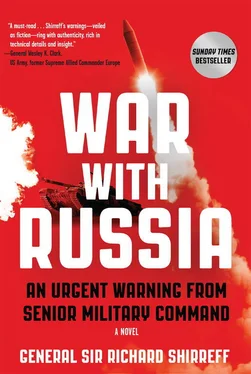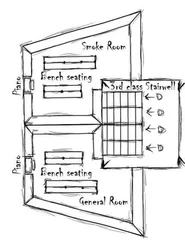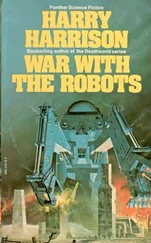McKinlay, recalling his Commandant’s paper on Carl von Clausewitz at Camberley, quoted from the Prussian philosopher of war: “War has its own grammar, but not its own logic.” Then he added, “And he’s also forgotten that strategy has a human dimension.”
“That’ll be our opportunity, Dave,” continued Howard. “In his quest for dominion. What do the Russians call it… Derzhava . He’s failed to take account of the reality of war; that there will always be completely unexpected turns of events that mean his intention to settle for one thing will become unrealistic and he’ll have to settle for something else. He thinks he can apply his professed A2/AA—anti-access/area denial—strategy to lock us out of the Baltics. But he’s not thought through the second- and third-order implications of that. Not least the fact that people in the Baltics won’t settle for it. And it’s my guess that most of the Russian speakers there will be outraged by what he’s done and join the opposition. They may have been getting hot under the collar with the internal politics of some of what was going on over there. But that’s the very point. It’s politics, and when push comes to shove, I’ll wager they much prefer living in an imperfect Western democracy than under the President’s boot. Look at the numbers of Russian-speaking Ukrainians who’ve been fighting the Russians there.”
Admiral Howard nodded to himself as he spoke, the Ivy League professor considering an intriguing hypothesis. “That’ll be our opportunity. We’ll find a way to unlock the door rather than try and bash it down. And I’ll tell you right now, my thinking is that we should start considering an attack somewhere other than the Baltics… like Kaliningrad. That’s what he’ll least expect. And that’s the way to ensure that the President’s hubris turns inexorably to nemesis.”
McKinlay nodded. He was also instinctively in favor of getting onto the front foot with offensive action, and Kaliningrad, the old, East Prussian port city on the eastern Baltic—once called Königsberg and now a tiny Russian territorial enclave, sandwiched between Lithuania and Poland—was a tempting target, particularly if the Russians became bogged down in the Baltics. Indeed, Kaliningrad was the key to the Baltics.
“I like that idea, SACEUR,” said McKinlay, “and you’ll remember that when we war-gamed a Russian attack on the Baltic states, we concluded that the most effective NATO response was to kick the Russians hard between the legs in Kaliningrad. Losing a bit of Russian territory will make the President look very stupid. If we can do that, we might just persuade him to pull out of the Baltics. Rather than go head to head against the Russians and almost certainly start a nuclear war, it would be much better to look for the indirect approach… and it could offer the politicians the option of a land swap down the line.”
Howard nodded in agreement and McKinlay continued, “The good news is that the maritime element of the NRF is in a position to respond. We’re only talking about five frigates and destroyers and they’re in the Mediterranean, so it’ll take eight days to get to the Baltic. On top of that, the Brits are getting Queen Elizabeth and an amphibious task group ready to deploy to the Baltic.”
“Now that’s more like it!” Howard was instantly enthused. “That will tie in well. If the Brits wait for the NATO force to arrive, we’ll have a useful package. It would be even better if they came together and waited for the US. We’ve got a carrier group based on the Theodore Roosevelt heading across from Norfolk, Virginia. They’ll be off Copenhagen by the first of June. 6th Fleet is making best speed from the Red Sea and will be on station in the southern Baltic by the fifth of June.”
“OK, Sir. Are you happy to give the executive order to get them moving? As for an attack on Kaliningrad, we’d better get the staff thinking about it right now, even though it will take time to put sufficient forces together. I’ll talk to the Chief of Staff and ask him to start framing the problem.”
“Go for it, Dave. Do it now.”
0440 hours, Friday, May 26, 2017
Somewhere in the forest, Gauja National Park, Latvia
MORLAND STRETCHED HIS cramped legs and wiggled his toes in his boots in an attempt to get the blood circulating in his chilled feet. He was lying prone under a camouflaged waterproof poncho, which covered his shallow trench overlooking a track that led down the slope to a rickety hunter’s footbridge over the River Gauja. Another poncho beneath him gave minimal protection from the damp and cold seeping from the earth up into his body. He lay behind a Latvian 7.62 General Purpose Machine Gun—known universally as the GPMG, or more familiarly as the “gimpy.” It was Belgian-made, but exactly the same weapon Morland had been trained on as a cadet at Sandhurst and still, after fifty years, the main British infantry section heavy machine gun. The GPMG was made ready with the first round of a belt of 200 in the breach. The remainder of the belt was coiled neatly on the poncho to the left of the gun.
Just like being on stag, on sentry duty, back in the forest blocks at Sennybridge in Wales , he thought. Only difference is, it’s not raining… yet.
Normally he would have a number two beside him to feed the belt smoothly into the breach—they might be fearsome bits of kit, but they were also temperamental and prone to jamming, if not operated correctly—but right now Morland was alone. He was on guard while the rest of the team slept in the bunker behind him. He liked taking the last stag before dawn “stand to.” It meant he was awake before the rest of his team and able to think through and reflect on what the day ahead would bring. It had been bitter overnight, but around him the forest was coming to life. The dawn chorus of songbirds was sounding as the first gray light began to filter through the fresh green of the new leaf cover. In front of him, the river tumbled over stones into pools of clear water. A red deer stag grazed on the far side of the river, blissfully unaware of his presence.
However, try as he might, he could not expunge from his mind’s eye the blinding flash and roar as HMS Padstow had been blown apart five days earlier. Since then events seemed to have gone into uncontrolled overdrive. During the drive to Ādaži, Krauja remained silent at the wheel, stunned by the violence she had witnessed and the probable death of her brother at Riga Airport, but staying focused and determined as she drove the Toyota at speed through Riga and back to the Latvian Special Tasks Unit training camp. They had arrived not a moment too soon, as the Latvians were preparing to deploy into the forest; going underground to fight. Ādaži would be a key military target for the Russians as soon as they were established in Riga. They had to get out and fast.
“The rest of the unit is on the border. We’ve only got twenty guys and we could really use reinforcement—if you’re happy to work with us, Tom,” said Major Jānis Krastiņš, the Special Tasks Unit commander. “Why don’t you check back with the UK and then we need to get you kitted out fast. Just tell me what you need.”
They’d set up the satellite link and called PJHQ, who’d agreed Morland’s suggestion that he and his team should remain with the Special Tasks Unit. However, they were only to coordinate with the Latvians so as to be able to observe and monitor the situation. Morland was under specific orders to avoid confrontation with the Russians, until it became clear what action NATO was to take. Killing Russians, or being caught or killed himself, might well limit the government’s ability to maneuver. When he reminded PJHQ of his description of the sinking of Padstow and suggested that must change his mission, he was abruptly told to follow orders.
Читать дальше












